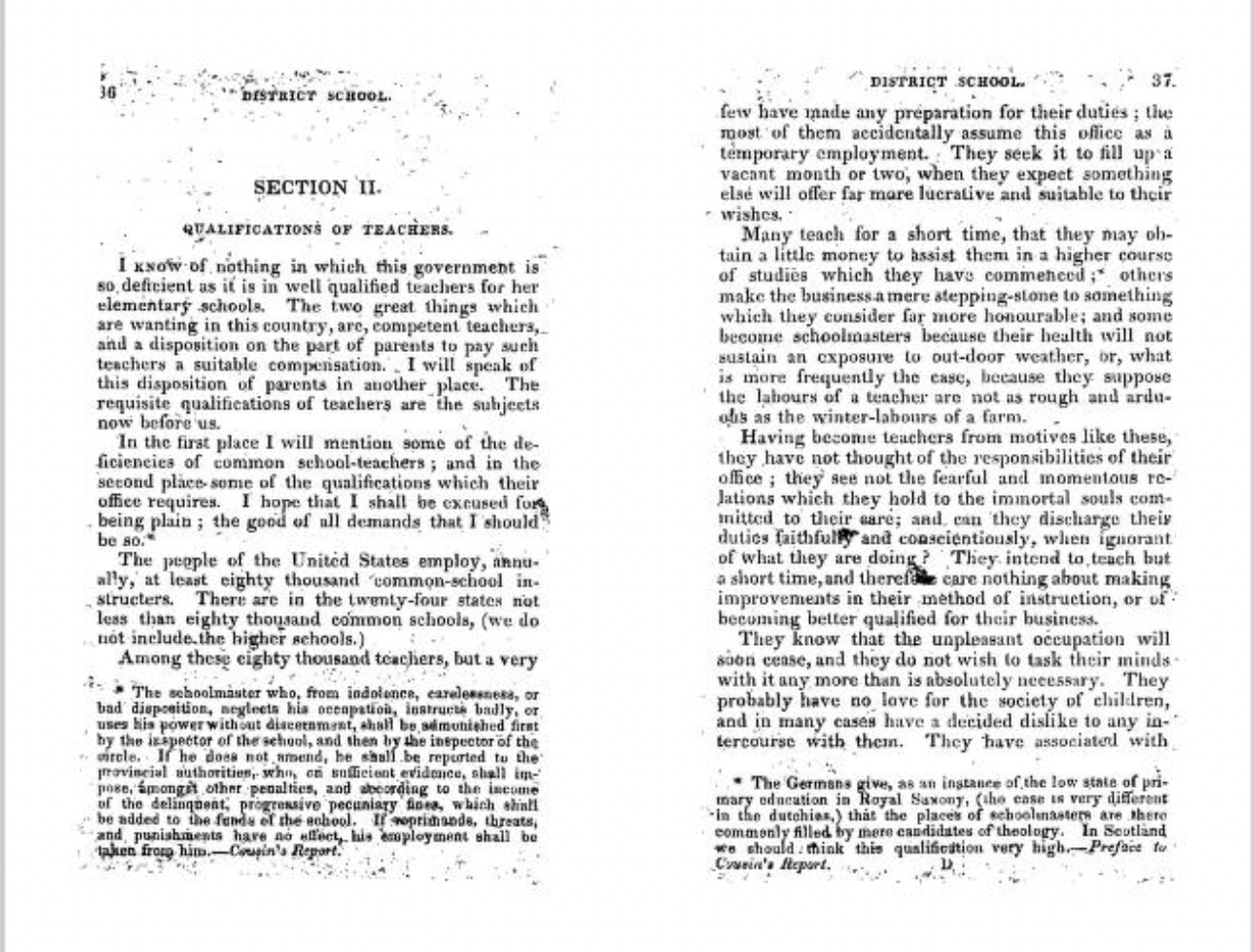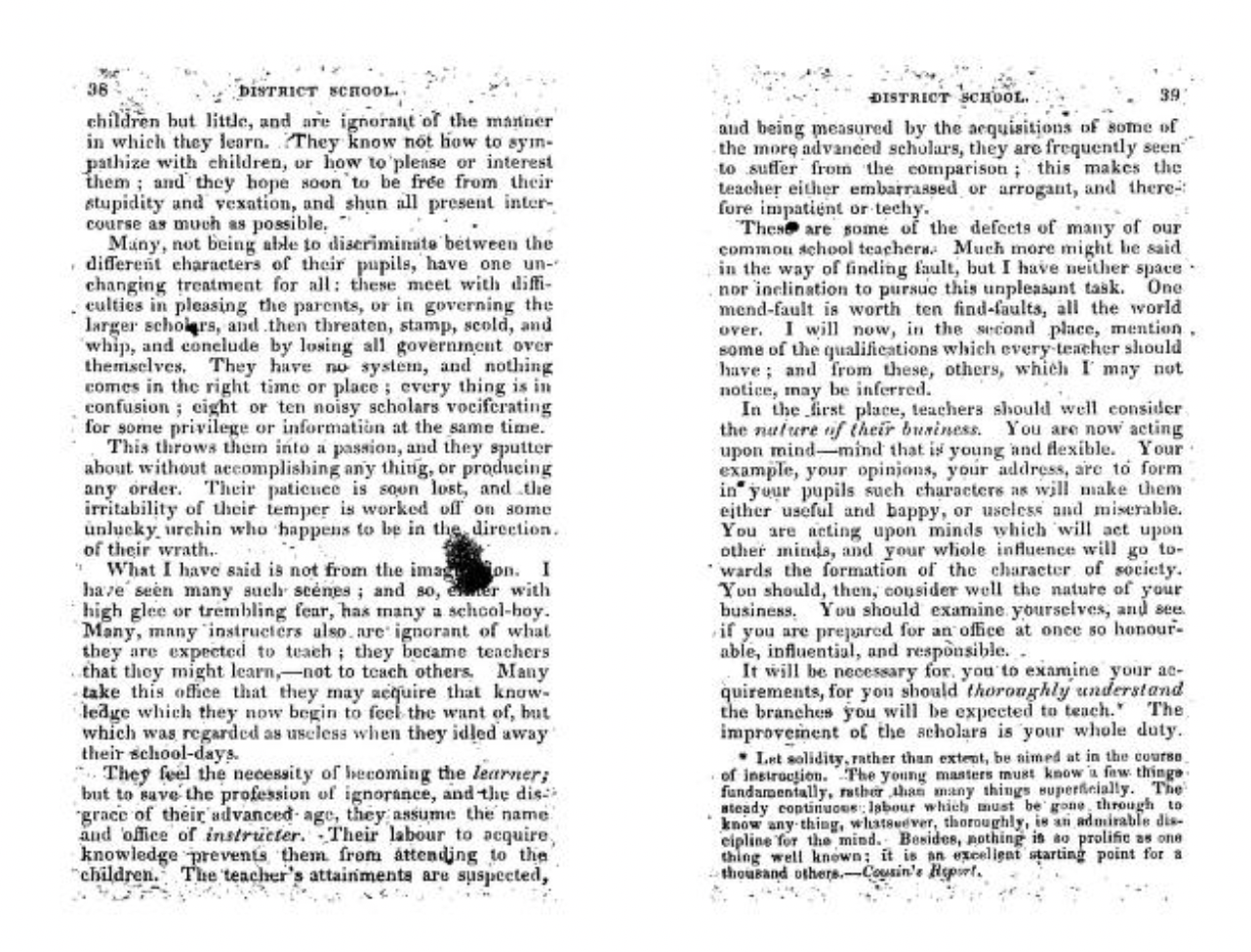Commentary on public schools during JS's time.
- Type
- Book
- Source
- J. Orville Taylor Non-LDS
- Hearsay
- Secondary
- Reference
J. Orville Taylor, The District School. (New York: Harper, 1834), 36-38
- Scribe/Publisher
- J. Orville Taylor
- People
- J. Orville Taylor
- Audience
- General Public
- Transcription
The requisite qualifications of teachers is the subject now be- fore us. In the first place I will mention some of the deficiencies of common school-teachers ; and in the second place some of the qualifications which their office requires. I hope that I shall be excused for being plain ; the good of all demands that I should be so. The people of the United States employ, annu-ally, at least eighty thousand common-school instructors. There are in the twenty-four states not less than sixty thousand common schools (we do not include either the public or the higher schools).
Among these eighty thousand teachers, but a very few have made any previous preparation for their duties ; the most of them accidentally assume this office as a temporary employment. They seek it to fill up a vacant month or two, when they expect something else will offer far more lucrative or suitable to their wishes.
Many, again, teach for a short time, that they may obtain a little money to assist them in a higher course of studies which they have commenced ; others make the business a mere step-stone to something which they consider far more honourable ; and a few become school- masters because their health will not sustain the exposures of the out-door weather, or, what is more frequently the case, because they suppose the labours of a teacher are not as rough and arduous as the winter-labours of a farm.
Having become teachers from motives like these, they have never thought of the responsibilities of their office ; they see not the fearful and momentous relations which they hold to the immortal souls committed to their care ; and can they dis- charge their duties faithfully and conscientiously, when ignorant of what they are doing ? They intend to teach but a short time, and therefore care nothing about making improvements in their method of instruction, or of becoming better qualified for their business.
They know that the unpleasant occupation will soon cease, and they do not wish to task their minds with it any more than is absolutely necessary: they probably have no love for the society of children, and in many cases have a decided dislike to any intercourse with them. They have associated with children but little, and are ignorant of the manner in which they learn. They know not how to sympathize with children, or how to please or interest them : and they hope soon to be free from their stupidity and vexation, and shun all present intercourse as much as possible.
Many are not able to discriminate between the different characters of their pupils, and have one unchanging treatment for all : they meet with difficulties in pleasing the parents, or in governing the larger scholars, and then threaten, stamp, scold, and whip, and conclude by losing all government over themselves : they have no system, and nothing comes in the right time or place ; every thing is in confusion ; eight or ten noisy scholars vociferating for some privilege or information at the same time : this throws them into a passion, and they sputter about without accomplishing any thing, or producing any order ; their patience is soon lost, and the irritability of their temper is worked off on some unlucky urchin who happens to be in the direction of their wrath. What I have said is not from the imagination ; I have seen many such scenes ; and so, either with high glee or trembling fear, has many a school-boy. Many, many instructers are ignorant also of what they are expected to leach ; they become teachers that they may learn, not that they may teach others.
Summary: This book is a brash account of public schools written in 1834, so referring to the direct time period of Jospeh Smith. It focuses on how the teachers often do not have the ability to teach reading and writing. The book itself asserts that while literacy was taught by teachers and acquired by children, that the literacy that was taught was not adequate, because they would misspell words and would teach concepts incorrectly. This is largely seen as an inditement of the time period's education, especially in rural areas, suggesting that while basic skills would be acquired through schooling, schooling lacked in several areas.
- Source Link
- https://catalog.library.vanderbilt.edu/discovery/fulldisplay/alma991034811279703276/01VAN_INST:vanui
- BHR Staff Commentary
- Citations in Mormonr Qnas
The B. H. Roberts Foundation is not owned by, operated by, or affiliated with the Church of Jesus Christ of Latter-day Saints.


